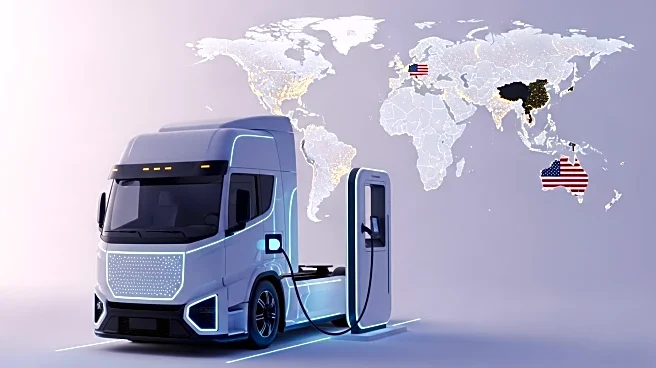What's Happening?
A recent report from BloombergNEF indicates a significant increase in the global demand for medium and heavy trucks with zero tailpipe emissions. The report highlights that electric trucks are becoming cost-competitive in various countries due to advancements in technology, infrastructure expansion, and supportive policies. In the first half of 2025, zero-emission truck sales reached nearly 90,000 units worldwide, with China accounting for over 90% of these sales. The European market is also experiencing growth, while sales in the U.S. have declined due to policy reversals. Battery technology remains the dominant choice for zero-emission trucks, capturing 97% of global sales. The report also notes the decline in the market for hydrogen fuel cell trucks, with only about 1,000 units sold in the first half of 2025.
Why It's Important?
The rapid growth of electric trucks globally signifies a shift towards more sustainable transportation solutions, which could have significant implications for reducing road transport CO2 emissions. The U.S.'s lag in electric truck adoption, due to policy changes, could impact its ability to meet net-zero carbon emissions targets by 2050. The economic benefits of electric trucks, such as lower operating costs and reduced environmental impact, are driving their adoption in other regions. The report suggests that by 2030, nearly half of medium and heavy-duty trucks will be cheaper to operate as zero-emission vehicles compared to traditional diesel-powered vehicles. This transition could reshape the global automotive industry and influence future policy decisions.
What's Next?
The BloombergNEF report indicates that the electric truck market is projected to grow significantly, with a valuation of $29.69 billion in 2025 and reaching $124.97 billion by 2030. The U.S. may need to reconsider its policies to avoid falling further behind in the global transition to electric trucks. State-level programs and corporate activities in the U.S. show latent demand for electric trucks, with purchase vouchers available in states like California and New York. The construction of dedicated truck charging stations continues, which could support future growth in electric truck adoption.
Beyond the Headlines
The report highlights the importance of policy support in driving the adoption of electric trucks. China's efficiency standards and incentives for fleet operators to scrap older polluting trucks are contributing to its leadership in the electric truck market. In contrast, the U.S. has seen regulatory changes that have slowed the market, such as the relaxation of federal CO2 emissions targets for medium and heavy-duty trucks. The domestic supply chain for truck batteries in the U.S. is still developing, which could affect future growth.











